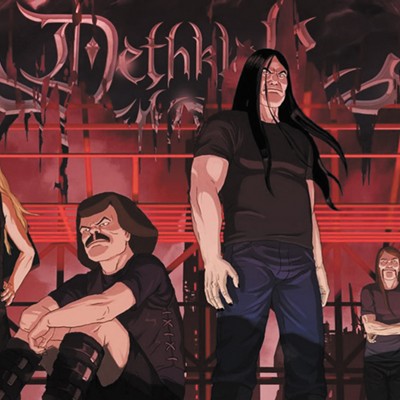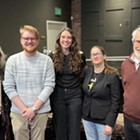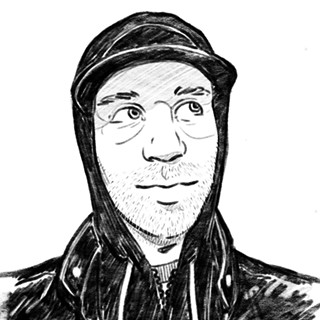It's easy to envision tango. Two dancers draped over one another, nose to nose, intertwining legs, quick stepping, spinning, dipping and almost pulsating with unbridled sensuality. It's just about the steamiest thing you can watch without venturing into NSFW territory.
And while most people can conjure a visual in their heads when they hear "tango," being able to quickly recall the sound of tango doesn't come as naturally for most.
Spokane quartet Tango Volcado is all about making tango's soundscape more prevalent throughout the city.
The group specializes in nuevo tango, the Argentine subgenre that blends traditional tango with elements of jazz and a dash of classical music. Formed in 2009, Tango Volcado currently consists of Eugene Jablonsky on upright bass, Patricia Bartell on accordion, Tana Bachman-Bland on violin, and Jody Graves on piano. Tango Volcado isn't any of their primary gigs: Bachman-Bland is a former Spokane Symphony member who freelances for Broadway shows and other bands while also supplementally teaching at Mead High School; Graves is a traveling performer and professor at Eastern; Jablonsky plays with Spokane Jazz Orchestra and is also a former Spokane Symphony member; and beyond being an award-winning accordionist, Bartell is a businesswoman who just released her own motivational business book, From Crutches to Crushing It: A Journey from Pain to Power. And while they all have other endeavors, the joy of playing tango provides a special spark.
That spark — as well as many other sparks — will be on display when Tango Volcado joins the Spokane Symphony for the special "Tangos & Tapas" Valentine's Day show at the Fox. Not only will Tango Volcado and the symphony play pieces on their own and collaboratively, but the romantically inclined event will also feature pre-show Latin tapas courtesy of Feast World Kitchen chefs, routines from world-renowned mononym tango dancers Sandor and Parissa, and post-show tango lessons from the pair with accompaniment by Tango Volcado.
There are a variety of musical characteristics that make tango instantly stand out, but the core of the genre's signature sound is the rhythm. Typically played in 2/4 or 4/4 time, tango leans heavily on syncopated (offbeat) rhythms with staccato notes. (For the more music theory inclined, tango uses a duple meter — where there are two beats per measure.) To simplify that — the rhythmic patterning of the music gives tango numbers that signature propulsive passion.
"The notes are literally a dance," says Bachman-Bland. "They are sometimes so raw, that it really does touch our base human parts of us."
Tango blends together a variety of world music flavors including Eastern European folk styles like polka and mazurka, Spanish flamenco and contradanza, and rhythmic underpinnings from African music. The melding in part explains the instrumentation of tango, which traditionally includes the bandoneon — though Tango Volcado's Bartell goes with the bandoneon's larger cousin, the accordion. She greatly appreciates the genre's ability to expand people's perception of her instrument.
"I think the accordion has been so stereotyped — especially in the U.S. with polkas," says Bartell. "So when we get into tangos, it's got a totally different feel — so many different colors."
The thing about tango music that absolutely thrills the members of Tango Volcado is the freedom of the music. Tango might not be as free-flowing as jazz, but there's certainly far less adherence to structure than playing a classical symphonic piece. Tango encourages the musicians to be creative in the moment and play off one another.
"Tango challenges me to become an even better musician. Sometimes in the moment in a performance something happens that you didn't plan, and next thing you know, you're smiling and you're looking at your colleagues like that just happened," says Bachman-Bland. "I just get so giddy. It's so fun. It's so energizing. It's beautiful. It hits all of those emotions."
"It's freeing. It stretches me, but working with these amazing musicians," adds Graves. "There's so much opportunity for being creative. You have a map with the score we have, but if you actually knew how to follow it — we're not playing everything on that map."
"It's so much improv. The notes are just a suggestion or suggestion," says Bartell. "It reminds me of the traffic lights in the Philippines or Uganda — they're just a suggestion."
Beyond the joyful interplay that happens on-stage, the other thing that makes playing tango such a rush is the audience response. Like the music itself, it's energetic to say the least.
"When you're a classically trained musician, especially being a symphony player, you're taught there's a wall between you and the audience. You're not there to be calling attention to yourself. It's about the music," says Bachman-Bland. "So for me, [Tango Volcado] has broken me out of that — it's OK to have personality on stage. It's OK to smile at your audience. It's OK to laugh with them and make jokes. It allows us freedom to discover more of who we actually are musically."
And tango's breakdown of the wall between performers and the audience transcends cultures.
"I remember playing a tango once in the Middle East — in Ramallah in the West Bank — on a tour I was doing with the U.S. State Department," Graves says. "Played this tango — 'Oblivion,' one of the pieces we're doing at this [Spokane Symphony] concert — and the room of Middle Eastern people were just enamored with it. At the end they said, 'Can you play it again?' So there's a connection, viscerally."
So what exactly is it that people are responding to in tango music? Well... let's say there's a reason that Tango Volcado's show with the Spokane Symphony is a Valentine's Day affair. Tango is — to put it bluntly — extremely sexy music. It's music that still can push the edges of what feels acceptable in many cultures. It feels hot, sensual and borderline taboo.
"The relationship with tango for every single human being is it's raw. It's emotional," says Bachman-Bland. "It was actually forbidden [in some places]. The intimacy between the dancers... it can get naughty."
"And when you see the dancers who are coming from San Francisco [for the Spokane Symphony concert] — I got to work with him last year in a different tango setting — they're phenomenal. They're so beautiful together, and so on the edge of super intimacy," Bachman-Bland says with a laugh. "Seeing them dance will make you... feel things."
While Tango Volcado is far from a full-time gig and can be hard to schedule due to each of the four members' other commitments, their collective love for the music keeps them coming back. The group hopes to make another album in the not-too-distant future and will be performing as a featured act at Washington State Music Teachers Association Conference held at Gonzaga this June. But for now, "Tangos & Tapas" with the Spokane Symphony is the focus.
Bachman-Bland says that her former symphony colleagues are "itching" to let their proverbial hair down and play some tango. That said, she recognizes it may be a tougher task than normal for Spokane Symphony's assistant conductor, Shira Samuels-Shragg, since the main melody in tango doesn't always hit on the beat. But that change of pace will hopefully be appealing to the Spokane Symphony's typical patrons.
"I want to create more of a reason for audience members to want to come back to the symphony, and create more of an intimate, human connection with them," says Bachman-Bland.
The "Tangos & Tapas" concert will feature Tango Volcado playing Astor Piazzolla's "Oblivion" and Piazzolla's "Libertango," the symphony doing a host of romantic numbers including Tchaikovsky's "Fantasy Overture" from Romeo and Juliet and selections of the scores from La La Land, Westside Story and Love Actually, and both ensembles coming together for Piazzolla's "Milonga del Angel" and Matos Rodríguez's "La Cumparsita." For those who think the symphony is too stuffy, programs like "Tangos & Tapas" should dispel that stereotype.
"If you've got a concert where you're playing a Brahms and this and that... then you throw in some tangos? Your audiences are loving this stuff," adds Graves.
It's one thing to be able to envision tango. It's another thing to be able to conjure the music in your head. But to fully understand tango — well, you just have to experience the passion in person. ♦
Tango & Tapas: Valentine's Day with Spokane Symphony •
Wed, Feb. 14 at 7 pm • $99-$145 • The Fox Theater • 1001 W. Sprague Ave. • foxtheaterspokane.com • 509-624-1200























